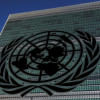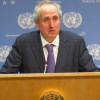Take action to stop ‘madness’ on Rohingyas: UN rights body chief

The United Nations (UN) human rights chief Zeid Ra'ad Al Hussein today condemned "widespread, systematic and shockingly brutal attacks" against Rohingyas, as well as decades of discrimination and persecution.
The UN High Commissioner for Human Rights also urged a special session of the UN Human Rights Council on the current situation of Rohingyas in northern Rakhine state of Myanmar "to take the appropriate action to stop this madness now".
Also read: Dealing with Rohingya Crisis: UN assures full cooperation
"How much do people have to endure before their suffering is acknowledged and their identity and rights are recognised, by their government and by the world?" he asked.
He also urged the council to consider making a recommendation to the UN General Assembly that it establish a new impartial and independent mechanism, complementary to the work of the Fact-Finding Mission into the latest wave of violence and abuses, to assist individual criminal investigations of those responsible.
Read more: Myanmar needs to engage with UN, Bangladesh
He said that given the decades of statelessness imposed on the Rohingya, policies of dehumanising discrimination and segregation, and the horrific violence and abuse, along with the forced displacement and systematic destruction of villages, homes, property and livelihoods - "can anyone rule out that elements of genocide may be present?"
"Ultimately, this is a legal determination only a competent court can make," he told the Council.
Read also: UN shelved hunger report on Rohingyas
"But the concerns are extremely serious, and clearly call for access to be immediately granted for further verification."
By December 2, an estimated 626,000 refugees - or more than half the estimated number of Rohingya living in Rakhine State - had fled to Bangladesh since October 2016, and particularly since August 2017. The Myanmar Government has said its latest campaign in northern Rakhine was in response to attacks by insurgents.
Zeid said his Office had sent three teams to Bangladesh this year to monitor the situation and interview refugees.
He said witnesses reported acts of appalling barbarity committed against the Rohingya, including deliberately burning people to death inside their homes; murders of children and adults; indiscriminate shooting of fleeing civilians; widespread rapes of women and girls; and the burning and destruction of houses, schools, markets and mosques.
Zeid said he had reported to both the Human Rights Council and the Security Council about the persistent allegations of serious human rights violations by security forces.
Yet, he added, prosecutions for alleged acts of violence against them, including sexual violence – whether committed by security forces or civilians – appeared to be extremely rare.
"Refusal by international as well as local actors to even name the Rohingyas as Rohingyas – to recognise them as a community and respect their right to self-identification – is yet another humiliation, and it creates a shameful paradox: they are denied a name, while being targeted for being who they are," he added.
Zeid told the Special Session of the Council that it appeared very probable that by continuing to dehumanise the Rohingya the state authorities would fuel even wider levels of violence in the future. "We cannot afford to hear that historical and tragic refrain, one more time, that no one knew it would turn out to be like this — what a lie that would be," he said.
The High Commissioner warned against the premature repatriation of any refugees in the absence of sustained human rights monitoring on the ground and without first addressing the root causes of the crisis.
He cited a similar situation in the 1990s when refugees who fled Rakhine State started to return but were again forced to take flight.
"The world cannot countenance a hasty window-dressing of these shocking atrocities, bundling people back to conditions of severe discrimination and latent violence which seem certain to lead in the future to further suffering, and more movements of people," the UN human rights chief said.

 For all latest news, follow The Daily Star's Google News channel.
For all latest news, follow The Daily Star's Google News channel. 








Comments